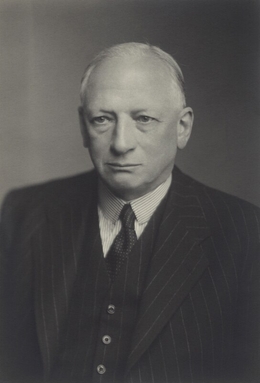Hugh Beaver facts for kids
Quick facts for kids
Hugh Beaver
|
|
|---|---|
 |
|
| Born |
Hugh Eyre Campbell Beaver
4 May 1890 |
| Died | 16 January 1967 (aged 76) London, England
|
| Resting place | Holy Trinity Church, Penn Street |
| Nationality | English, South African |
| Alma mater | Wellington College, Berkshire |
| Occupation | Engineer, industrialist |
| Years active | 1931–1960 |
| Board member of | The Guinness Book of World Records, Guinness Brewery |
Sir Hugh Eyre Campbell Beaver (born May 4, 1890 – died January 16, 1967) was an important person from England and South Africa. He was an engineer and a businessman. He is most famous for starting the Guinness World Records, which was first called the Guinness Book of Records.
About Hugh Beaver
Hugh Beaver was born in Johannesburg, South Africa. He spent two years working with the police in India starting in 1910. Later, in 1921, he came back to England.
In England, he joined a civil engineering company called Sir Alexander Gibb & Partners. He worked as a special assistant to Sir Alexander Gibb himself. During World War II, he became a top leader in the new Ministry of Works. This government department helped manage building projects during the war.
Sir Hugh Beaver passed away in London on January 16, 1967. He was 76 years old.
Founding Guinness World Records
Sir Hugh Beaver is best known for creating the Guinness World Records. This famous book lists amazing world records. It started because of an idea he had while on a hunting trip. He and his friends were arguing about which bird was the fastest in Europe. They couldn't find a book to settle the argument.
This made Sir Hugh realize there was a need for a book that could answer all sorts of "superlative" questions. These are questions about what is the "most," "least," "biggest," or "smallest" of something. He thought such a book would be very popular. So, he decided to create it. The first Guinness Book of Records was published in 1955. It quickly became a huge success around the world.
Work on Air Pollution
Sir Hugh Beaver also played a big role in helping to clean up London's air. In 1952, London suffered from a terrible event called the Great Smog. Thick, dirty fog covered the city for days. It caused many people to get sick.
After this event, Sir Hugh was chosen to lead a special group called the Committee on Air Pollution. This group was also known as the Beaver Committee. Their job was to study London's serious air pollution problem. In 1954, the committee shared their findings. Their report led to important changes. These changes helped to make the air in London much cleaner.
 | Laphonza Butler |
 | Daisy Bates |
 | Elizabeth Piper Ensley |

